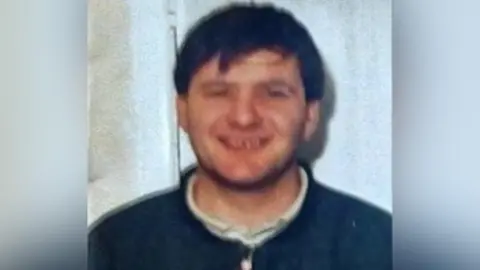Challenge over secret intelligence goes to Supreme Court
 Family handout
Family handoutThe Supreme Court will hear a case later which campaigners believe has implications for state secrecy around several killings during the Northern Ireland Troubles.
The case has been brought by the Northern Ireland Secretary Hilary Benn.
He is appealing a decision in which a coroner intended to release some intelligence information about the loyalist murder of Paul "Topper" Thompson in 1994.
The 25-year-old was travelling in a taxi which was fired upon by the Ulster Freedom Fighters (UFF) at Springfield Park in west Belfast.
His family believes the case involves state collusion.
Coroner Louisa Fee had planned to disclose a "gist", or summary, of intelligence at his inquest in March 2024, but Benn's predecessor, Chris Heaton-Harris, began a legal challenge which will now culminate in a two-day hearing in London.
Judgement will be delivered at a future point.
'Critical questions'
Amnesty International, Relatives for Justice and the Committee on the Administration of Justice (CAJ) are supporting Mr Thompson's family.
They said the case raised "critical questions" about the government's Neither Confirm Nor Deny policy, which is used "to prevent the disclosure of information on national security grounds".
CAJ director Daniel Holder said: "This case has wide implications for numerous bereaved families and the rule of law.
"National security cannot surely be invoked to conceal state wrongdoing or the involvement of state agents in killings or other human rights violations."
Mr Thompson's inquest was one of several halted under the last government's Legacy Act.
Labour has pledged to reinstate inquests under a replacement act.
The act was passed by the Conservative government in September 2023 despite opposition from Labour, all Northern Ireland parties, several victims' groups and the Irish government.
It created a new legacy body known ICRIR to take over all Troubles-era cases from 1 May 2024, including those on the desk of the Police Service of Northern Ireland.
The act shuts down all historical inquests.
The act's most controversial element, the offer of conditional immunity to suspects, has been disapplied following legal action by bereaved families.
